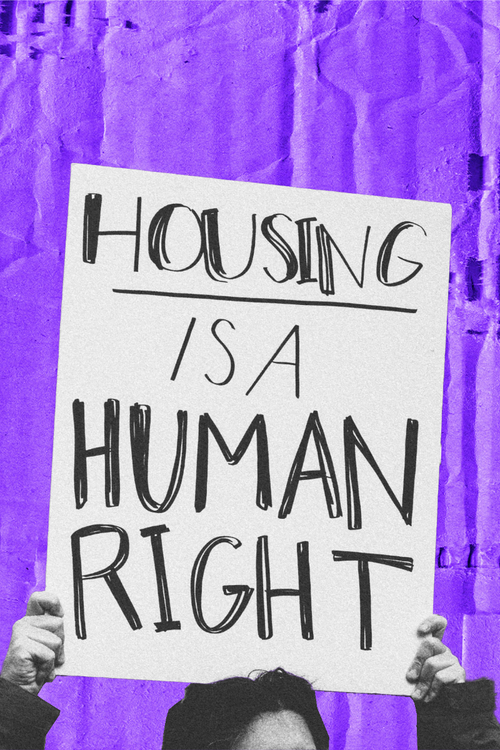It’s a gloomy morning in downtown Fresno, and a small group of women makes their way out of the front door to a historic mission-style home.
“Hurry up, take my picture in front of the house before they sell it!” said one of the women, standing proudly.
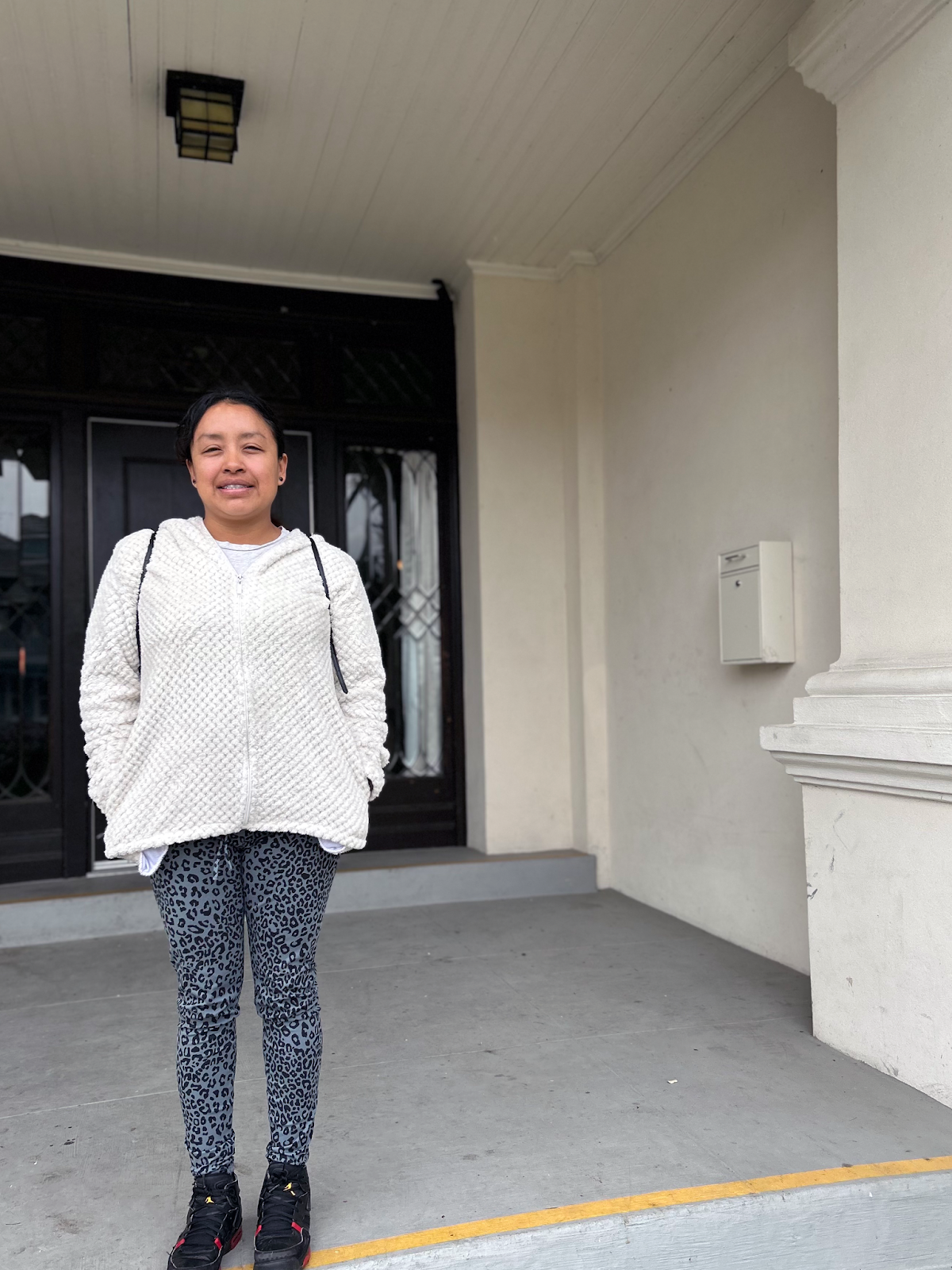
That woman is Benita Vasquez. She’s just came from a community meeting addressing the ongoing concerns for fair housing in the city of Fresno. She flashed one last smile before making it down the steps of the mission home.
Vasquez has lived in District 3’s downtown Fresno community for 15 years. She describes feeling comfortable in her community, it's a neighborhood where ties to the school and relationships with neighbors make her feel safe, Vasquez says.
A sudden obstruction in Vasquez’s melodic testimonial is a reminder of what’s at stake for many Fresno families who like Benita are being devastated by the city’s rent crisis. Vasquez said it's the increase in rent that is most affecting her family. With the recent cost increase of basic necessities like food and gas, Vasquez says paying $900 dollars for an apartment is a lot for low-income families, and especially frustrating for immigrant families. “It’s we who are the ones that don't qualify for many programs that the city sometimes provides,” said Vasquez. Although grateful to the City of Fresno for helping her brother avoid eviction through a protection program, Vasquez says immigrant families must be included in future housing programs.
“Include immigrant families in programs where we can become homeowners, we aren't asking for homes to be given to us, but we want to be involved in programs where we are given a path to become homeowners.”
An immigrant herself, Vasquez acknowledges the community’s role as a whole in contributing to the economy, paying taxes, and being great citizens. Since the height of the pandemic, advocating for housing became Vasquez’s focus. Feeling sad and frustrated, unable to do anything for her neighbors, Vasquez shed some of her own fears and started asking questions. Vasquez said it’s this same fear of receiving an eviction letter and retaliation that keeps tenants from reporting unsafe living conditions.
“We don't have rights, as tenants we don't have rights or protections,” Vasquez reiterated. As much as she wants fair housing policies to be passed, Vasquez stresses they are useless unless properly implemented and enforced by the City of Fresno.
When the city successfully implements programs like the eviction protection program, people stay in their homes. “So why are community members scared to use these programs?,” asked Vasquez. It’s a reality not just in Fresno, but all over the country for undocumented individuals who don't have a valid social security number. One solution to reduce fear in the community, suggests Vasquez, is for the City to inform undocumented community members about what housing programs they are eligible for.
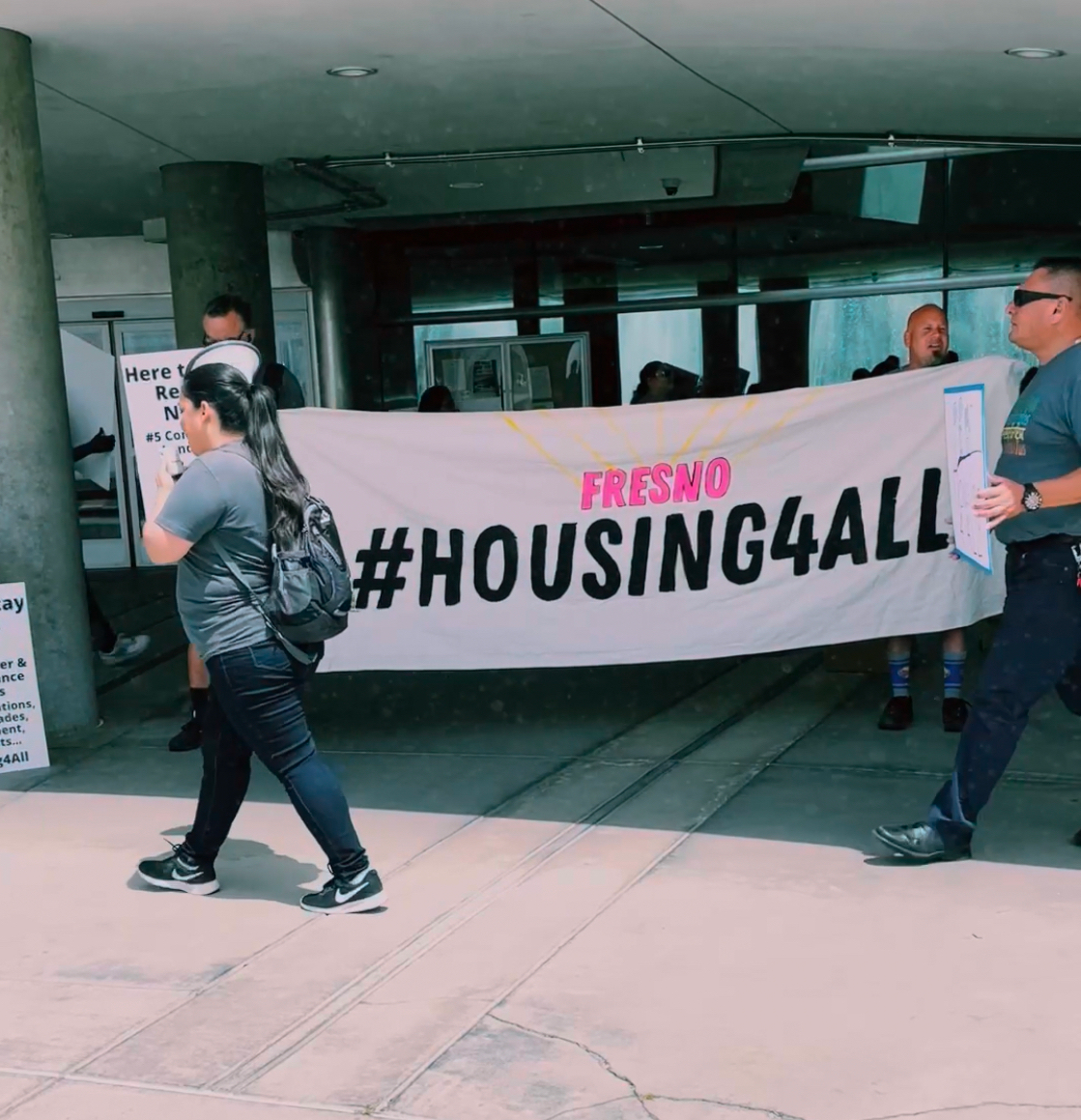
Benita wants two things, she wants to stay in the neighborhood with the community she has built over the past 15 years, and for rent increases to stop. Vasquez has already seen her rent increase twice within the last year, “it went up again in January and I am bracing myself for another increase in June because there is no rent control, it's not stopping.”
With the heavy amounts of rainfall across the Central Valley, farmworkers and construction workers are heavily impacted by the reduction in work. Vasquez’s husband works in construction and even before the recent weather impacts what he makes is barely enough to cover the family's basic needs and expenses. With no existing rent control policy in Fresno, landlords are legally allowed to raise the rent amount twice a year, and it's happening.
“If they evict you, they evict you, we live stressed, some live in cars, no one cares where they leave you,” said Vasquez.
Housing is extremely worrisome for Vasquez who is frustrated by what she has seen happen to her neighbors, adding that “you can’t always help when you yourself are also a bit scared.”
Karla Martinez, a Policy Advocate for Leadership Counsel for Justice and Accountability, works alongside community members like Benita Vasquez seeking stable and affordable housing in the city of Fresno. Originally from Los Angeles, Martinez moved to the Central Valley three years ago but her policy work began far before she made her way to Fresno.
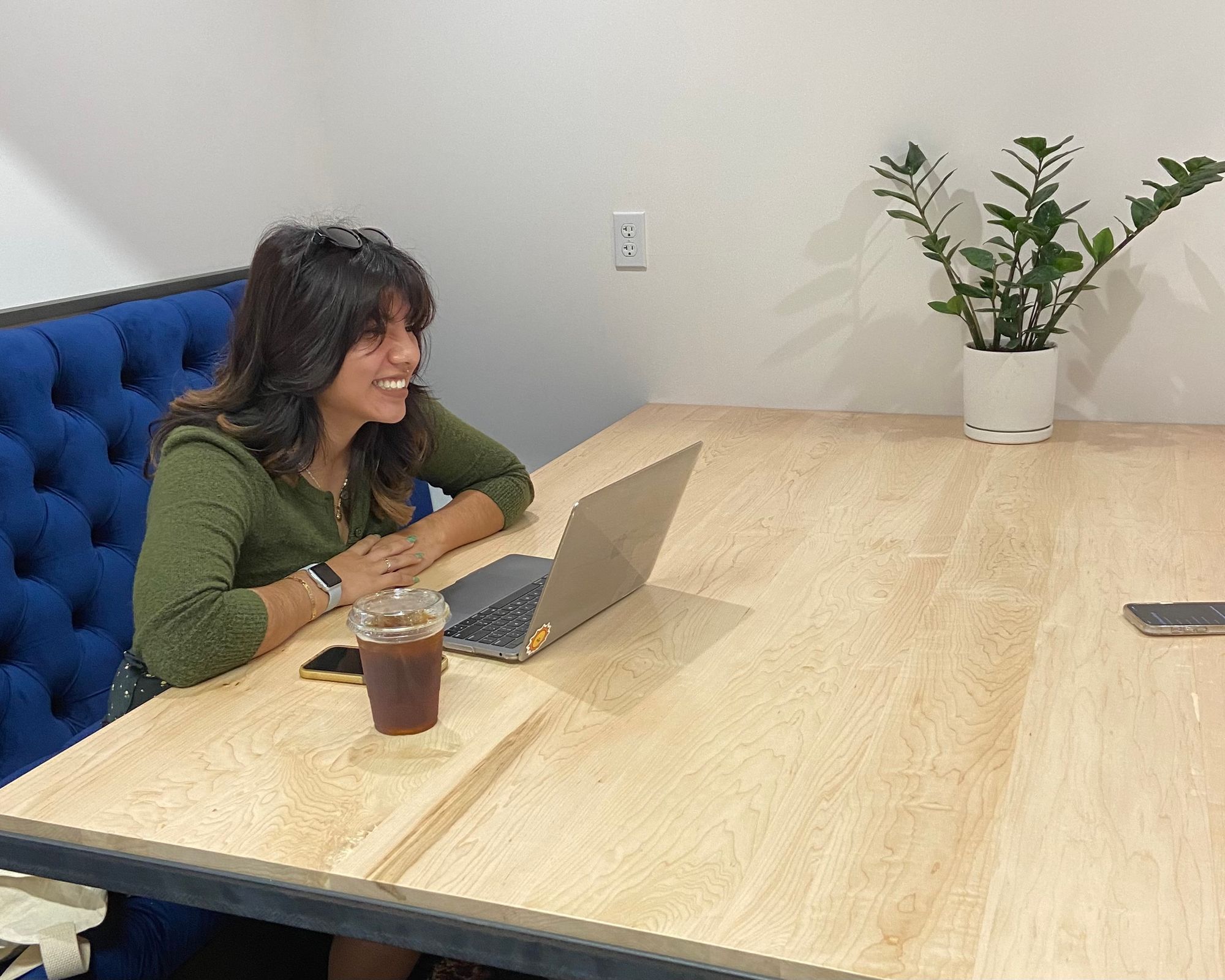
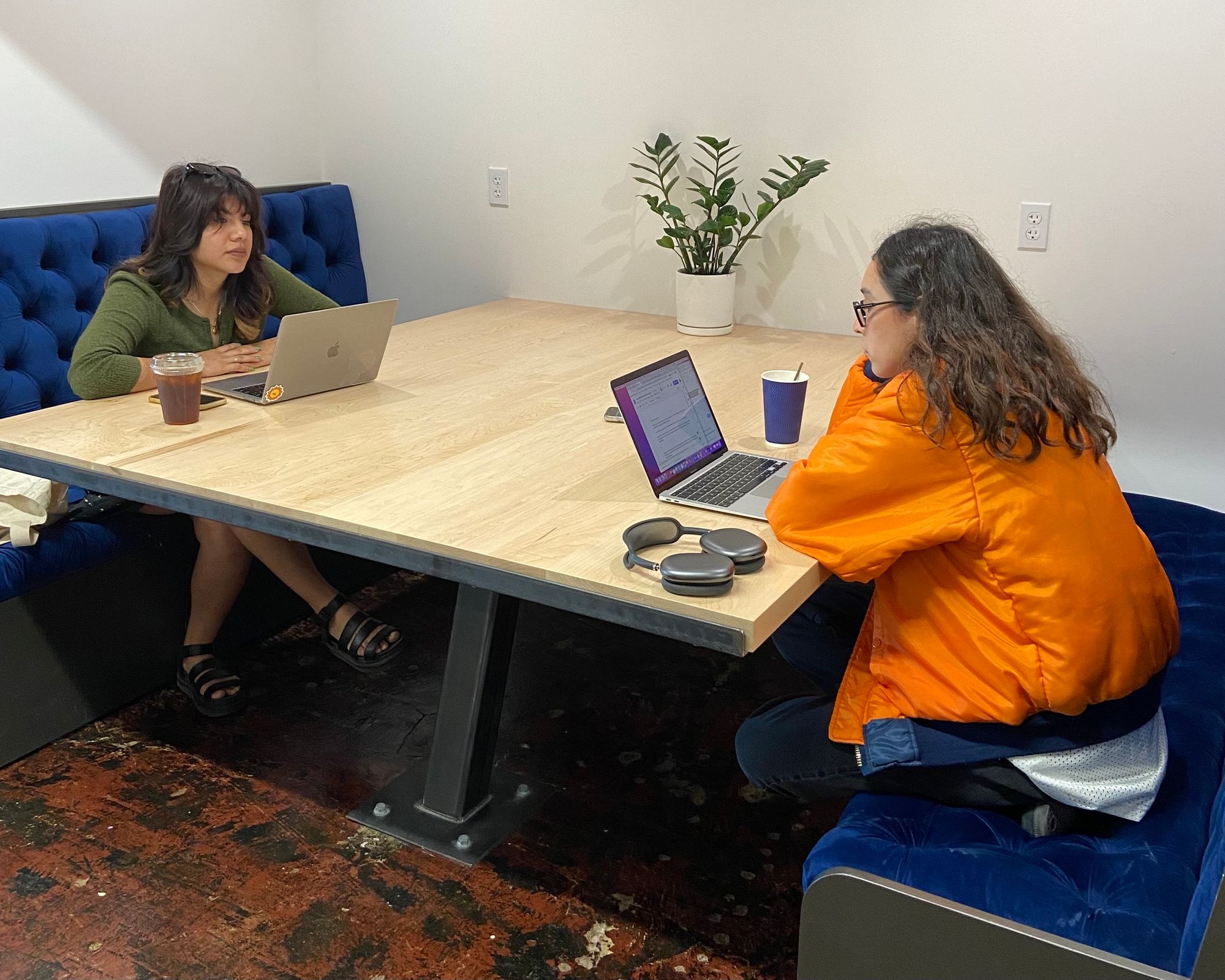
uSpark's Community Engagement Reporter, Fabiola Sahagun (right), interviewing Karla Martinez (left) form Leadership Counsel.
Martinez paints a clear picture of the biggest issues that we're seeing right now, not just in the Central Valley, but throughout all of the United States. It's the already unaffordable and rising rents that continue to happen, “even when folks are having to consistently live in these really inhabitable units.” says Martinez.
Martinez says the housing and renting crisis is something we need to stop thinking about as an individualistic experience, and instead as something that is happening to a lot of people in the city of Fresno where more than 50% of residents are renters.
“At least 50% of the folks in the city are experiencing some type of rent increase or harassment or retaliation. So, it's not just one individual. It's literally almost half of the city.” adds Martinez.
Through her work, Martinez learned it’s families and mothers having to make the decision between paying groceries and paying their cell phone bill which is a lifeline for a lot of folks. Skipping out on basic necessities in order to make rent is common, “People would rather have a roof over their head, even if it's falling over than be out on the street,” said Martinez.
A 2022 report released by the Fresno Madera Continuum of Care showed that homelessness in the Fresno and Madera areas increased by roughly 15.8% since January 2021. Martinez attributes Fresno’s growing homeless population to city officials not taking preventative policy actions to prevent people from becoming homeless in the first place. Like Benita Vasquez, Martinez shares the belief that what residents are asking for isn’t a lot, adding, “They’re literally just asking to live in a place they can continue to call home.”
On top of rising rents tenants are dealing with predatory and unjust landlords. Although the State of California legally requires landlords to provide safe housing, Martinez says tenants are often told to fix basic appliances and even mold-causing water damage out of their own pockets. Some tenants can't afford to wait for their landlord to respond to a maintenance request and find themselves making their own repairs time and time again. “It's money that should be coming out of the landlord's pocket because that's why they’re collecting rent every month, they get a fair rate of return on their rent to keep up the property and also make a profit,” says Martinez.
Tenants find themselves as the middlemen, they can either talk to their landlord or talk to someone at the city level. “If you're someone who doesn't know how the city works and you can’t go to your landlord because you’re afraid of retaliation, then what are you going to do?” asks Martinez. This is where Martinez feels the City of Fresno could be taking bigger action and why so many tenants are advocating for stronger just cause eviction protections and rent control to be implemented.
What is rent control?
Rent control or rent stabilization is a powerful mechanism for preventing displacement. A Rent Stabilization Ordinance in Fresno would limit the allowable annual rent increases for apartments and other rental housing. While a similar policy currently exists for mobile homes in Fresno, there is no such policy for other types of rental units. Under this policy, a landlord would still be allowed to set the initial rent, but they would be subject to an annual limit in terms of increasing the rent. In order for rent stabilization policies to work, they need to be coupled with additional restrictions on "no-cause" evictions or abusive use of the option to remove units from the rental market.
Martinez and tenants advocating for new housing policies sat down with Fresno City Council President and District 4 Councilman Tyler Maxwell to share their stories and to make known that the issues they are facing didn't come up overnight. According to Martinez, tenants are asking for a 3% cap on rent increase and seeking Maxwell’s help in securing support and that of his colleagues. “That’s the power that he holds, it’s to hold his colleagues accountable,” says Martinez. The group of tenants Martinez is helping organize are clear on what they want not only for themselves but also for their children. Martinez challenges the notion of City Council members who say people don't want to live or stay in Fresno, saying it's because they're not being allowed the opportunity to afford to do so.
Maxwell’s office did not respond to requests for comment by time of this publication.
Housing and politics go hand-in-hand for Martinez who shared a statement she hears often in her work, “we're all a lot closer at becoming homeless than we are at becoming rich because while we can afford to ignore the problem right now, we're all... at least personally I am a hospital bill away from becoming homeless and not being able to pay my rents and my bills on time.” This is why Martinez thinks it's important for everyone to get involved and especially young people, “this is your livelihood and this is the future that you’re to build upon hopefully if you stay in Fresno.”
“I don’t want to leave my neighborhood, I’ve had neighbors leave and it's sad that it's because they can't afford to stay. I want to stay here, but I want my voice to be heard and I want to have rights. I'm in the same situation, the fear is still there. As long as I don't own my own home that fear is going to continue.”

